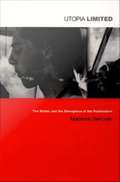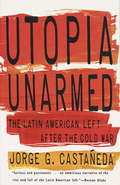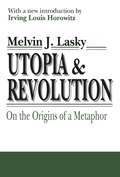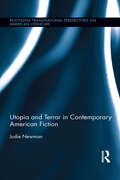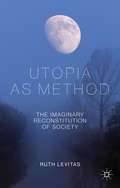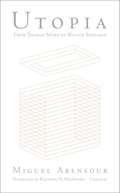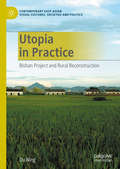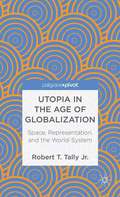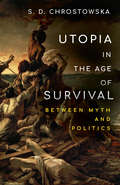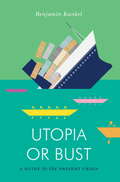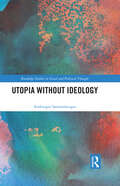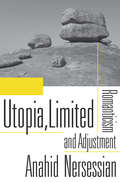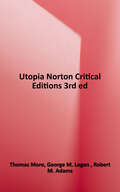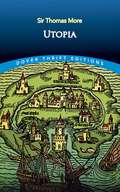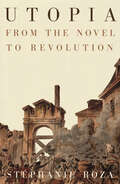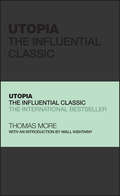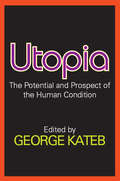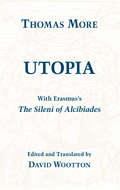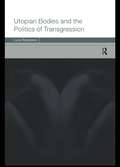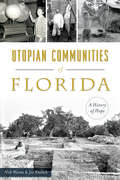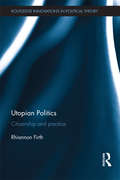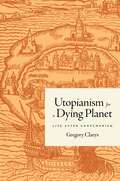- Table View
- List View
Utopia Limited: The Sixties and the Emergence of the Postmodern
by Marianne DekovenUtopia Limited is an original, engaging account of how postmodernism emerged from the political and cultural upheaval of the 1960s. Marianne DeKoven argues that aspects of sixties radical politics and culture simultaneously embodied the full, final flowering of the modern and the beginning of the postmodern. Analyzing classic sixties texts, DeKoven shows where the utopian master narratives underlying the radical and countercultural movements gave way to the "utopia limited" of the postmodern as a range of competing political values and desires came to the fore. She identifies the pivots where the modern was superseded by the nascent postmodern: where modern mass culture was replaced by postmodern popular culture, modern egalitarianism morphed into postmodern populism, and modern individualism fragmented into postmodern politics and cultures of subjectivity. DeKoven rigorously analyzes a broad array of cultural and political texts important in the sixties--from popular favorites such as William S. Burroughs's Naked Lunch to political manifestoes including The Port Huron Statement, the founding document of SDS (Students for a Democratic Society). She examines texts that overtly discuss the conflict in Vietnam, Black Power, and second-wave feminism--including Frances FitzGerald's Fire in the Lake, James Baldwin's The Fire Next Time, and Shulamith Firestone's The Dialectic of Sex; experimental pieces such as The Living Theatre's Paradise Now; influential philosophical works including Roland Barthes's Mythologies and Herbert Marcuse's One-Dimensional Man; and explorations of Las Vegas, the prime location of postmodernity. Providing extensive annotated bibliographies on both the sixties and postmodernism, Utopia Limited is an invaluable resource for understanding the impact of that tumultuous decade on the present.
Utopia Unarmed
by Jorge G. CastanedaCastro's Cuba is isolated; the guerrillas who once spread havoc through Uruguay and Argentina are dead, dispersed, or running for office as moderates. And in 1990, Nicaragua's Sandinistas were rejected at the polls by their own constituents. Are these symptoms of the fall of the Latin American left? Or are they merely temporary lulls in an ongoing revolution that may yet transform our hemisphere?This perceptive and richly eventful study by one of Mexico's most distinguished political scientists tells the story behind the failed movements of the past thirty years while suggesting that the left has a continuing relevance in a continent that suffers from destitution and social inequality. Combining insider's accounts of intrigue and armed struggle with a clear-sighted analysis of the mechanisms of day-to-day power, Utopia Unarmed is an indispensable work of scholarship, reportage, and political prognosis.
Utopia and Revolution: On the Origins of a Metaphor
by Irving Louis Horowitz Melvin J. LaskyThe most comprehensive study of ideology and utopia since Karl Mannheim's work of the 1930s, Utopia and Revolution can be understood as turning classical political theory on its head or, perhaps, inside out. Instead of the usual summary of how English radical theologies contributed to the revolutionary process, Lasky shows how such political theology of the mid-seventeenth century became the backbone of the natural history of revolutionary disasters. In a remarkable feat of scholarship in intellectual history, Lasky charts the course of this historic entanglement over some five turbulent centuries of Western history. In so doing, he traces the ideological extension of the human personality through the writings of political theorists, philosophers, poets, and historians.
Utopia and Terror in Contemporary American Fiction (Routledge Transnational Perspectives on American Literature #21)
by Judie NewmanThis book examines the quest for/failure of Utopia across a range of contemporary American/transnational fictions in relation to terror and globalization through authors such as Susan Choi, André Dubus, Dalia Sofer, and John Updike. While recent critical thinkers have reengaged with Utopia, the possibility of terror — whether state or non-state, external or homegrown — shadows Utopian imaginings. Terror and Utopia are linked in fiction through the exploration of the commodification of affect, a phenomenon of a globalized world in which feelings are managed, homogenized across cultures, exaggerated, or expunged according to a dominant model. Narrative approaches to the terrorist offer a means to investigate the ways in which fiction can resist commodification of affect, and maintain a reasoned but imaginative vision of possibilities for human community. Newman explores topics such as the first American bestseller with a Muslim protagonist, the links between writer and terrorist, the work of Iranian-Jewish Americans, and the relation of race and religion to Utopian thought.
Utopia as Method
by Ruth LevitasUtopia should be understood as a method rather than a goal. This book rehabilitates utopia as a repressed dimension of the sociological and in the process produces the Imaginary Reconstitution of Society, a provisional, reflexive and dialogic method for exploring alternative possible futures.
Utopia from Thomas More to Walter Benjamin (Univocal)
by Miguel Abensour“Utopia poses a question. Not simply in the sense of a problem to be resolved and at the same time eliminated . . . but in the sense that, within the economy of the human condition, utopia, the aim of social alterity—of all social otherness—is ceaselessly being reborn, coming back to life despite all the blows rained down upon it, as if human resistance had taken up residence within it.” For the French philosopher Miguel Abensour, the fictional genre of utopia has provided thinkers and artists a fertile ground to explore for the past 500 years, both as a way to imagine new emancipatory practices of shared existence and as a tyrannical imposition of power. Here, Abensour’s project is to examine the idea of utopia in two different but powerful moments in its trajectory: first, utopia’s beginning, when Thomas More sought a path for justice through a world in transformation, and second, when utopia faced its greatest danger, the moment that Walter Benjamin called “catastrophe.”
Utopia in Practice: Bishan Project and Rural Reconstruction (Contemporary East Asian Visual Cultures, Societies and Politics)
by Ou NingThis book is a collection of texts on one of China's boldest social experiments in recent years: the rural reconstruction project in Bishan. The Bishan Project (2011-2016) was a rural reconstruction project in a small village Bishan, Anhui Province, China. The writings describe and criticize the social problems caused by China’s over-loading urbanization process and starts a a contemporary agrarianism and agritopianism discourse to resist the modernism and developmentalism doctrine which dominated China for more than a century, answering a global desire for the theory and action of the alternative social solution for today’s environmental and political crises.This practical utopian commune project ran for 6 years and caused a national debate on rural issues in China, when it was invited to be exhibited and presented abroad. This collection of writing will be of interest to artists, China scholars, architects, and the cultural community at large.
Utopia in the Age of Globalization: Space, Representation, and the World System
by Robert T. Tally Jr.The idea of Utopia has made a comeback in the age of globalization, and the bewildering technological shifts and economic uncertainties of the present era call for novel forms of utopia. Tally argues that a new form of utopian discourse is needed for understanding, and moving beyond, the current world system.
Utopia in the Age of Survival: Between Myth and Politics
by S. D. ChrostowskaA pathbreaking exploration of the fate of utopia in our troubled times, this book shows how the historically intertwined endeavors of utopia and critique might be leveraged in response to humanity's looming existential challenges. Utopia in the Age of Survival makes the case that critical social theory needs to reinstate utopia as a speculative myth. At the same time the left must reassume utopia as an action-guiding hypothesis—that is, as something still possible. S. D. Chrostowska looks to the vibrant, visionary mid-century resurgence of embodied utopian longings and projections in Surrealism, the Situationist International, and critical theorists writing in their wake, reconstructing utopia's link to survival through to the earliest, most radical phase of the French environmental movement. Survival emerges as the organizing concept for a variety of democratic political forms that center the corporeality of desire in social movements contesting the expanding management of life by state institutions across the globe. Vigilant and timely, balancing fine-tuned analysis with broad historical overview to map the utopian impulse across contemporary cultural and political life, Chrostowska issues an urgent report on the vitality of utopia.
Utopia or Bust: A Guide to the Present Crisis
by Benjamin KunkelAfter the financial crash and the great recession, the media rediscovered Karl Marx, socialist theory, and the very idea that capitalism can be questioned. But in spite of the publicity, the main paths of contemporary critical thought have gone unexplored outside of the academy. Benjamin Kunkel's Utopia or Bust leads readers - whether politically committed or simply curious - through the most important critical theory today. Written with the wit and verve of Kunkel's best-selling novel, Indecision, this introduction to contemporary Leftist thinkers engages with the revolutionary philosophy of Slavoj i ek, the economic analyses of David Graeber and David Harvey, and the cultural diagnoses of Fredric Jameson. Discussing the ongoing crisis of capitalism in light of ideas of full employment, debt forgiveness, and "fictitious capital," Utopia or Bust is a tour through the world of Marxist thought and an examination of the basis of Western society today.From the Trade Paperback edition.
Utopia without Ideology (Routledge Studies in Social and Political Thought)
by Ambrogio SantambrogioThis book explores and proposes original definitions of central terms in political sociology and social theory, including political culture, imaginary, ideology, and utopia, in a manner that renders the individual definitions consistent with one another as part of a single and general conceptual framework for understanding social action. Through a Weberian distinction between means, ends, and values, together with the thought of Alfred Schütz and phenomenological sociology more generally, it sheds light on the ways in which the book’s key concepts make sense of social action, advancing the view that, rather than some promised land or aspiration, utopia is a project of broad and far-reaching collective action realized in its own enactment. As such, the book will appeal to scholars of social theory, political sociology, and political theory.
Utopia, Limited
by Anahid NersessianWhat is utopia if not a perfect impossible world? Anahid Nersessian reveals the basic misunderstanding of that ideal. Applying the lessons of art to the rigors of life on an imperiled planet, she enlists the Romantics to redefine utopia as an investment in limitation--not a perfect world but one where we get less than we hoped but more than we had.
Utopia, Limited: Romanticism and Adjustment
by Anahid NersessianWhat is utopia if not a perfect world, impossible to achieve? Anahid Nersessian reveals a basic misunderstanding lurking behind that ideal. In Utopia, Limited she enlists William Blake, William Wordsworth, John Keats, and others to redefine utopianism as a positive investment in limitations. Linking the ecological imperative to live within our means to the aesthetic philosophy of the Romantic period, Nersessian’s theory of utopia promises not an unconditionally perfect world but a better world where we get less than we hoped, but more than we had. For the Romantic writers, the project of utopia and the project of art were identical. Blake believed that without limits, a work of art would be no more than a set of squiggles on a page, or a string of nonsensical letters and sounds. And without boundaries, utopia is merely an extension of the world as we know it, but blighted by a hunger for having it all. Nersessian proposes that we think about utopia as the Romantics thought about aesthetics―as a way to bind and thereby emancipate human political potential within a finite space. Grounded in an intellectual tradition that begins with Immanuel Kant and includes Theodor Adorno and Northrop Frye, Utopia, Limited lays out a program of “adjustment” that applies the lessons of art to the rigors of life on an imperiled planet. It is a sincere response to environmental devastation, offering us a road map through a restricted future.
Utopia: A Revised Translation, Backgrounds, Criticism (Norton Critical Editions)
by Thomas MoreInspiring, provocative, prophetic, and enigmatic, Utopia is the literary masterpiece of a visionary statesman and one of the most influential books of the modern world. Based on Thomas More's penetrating analysis of the folly and tragedy of the politics of his time and all times, Utopia (1516) is a seedbed of alternative political institutions and a perennially challenging exploration of the possibilities and limitations of political action. This Norton Critical Edition is built on the translation that Robert M. Adams created for it in 1975. For the Third Edition, George M. Logan has carefully revised the translation, improving its accuracy while preserving the grace and verve that have made it the most highly regarded modern rendering of More's Renaissance Latin work.
Utopia: And History Of King Richard Iii (Dover Thrift Editions Ser.)
by Sir Thomas MoreFirst published in Latin in 1516, Utopia was the work of Sir Thomas More (1477-1535), the brilliant humanist, scholar, and churchman executed by Henry VIII for his refusal to accept the king as the supreme head of the Church of England. In this work, which gave its name to the whole genre of books and movements hypothesizing an ideal society, More envisioned a patriarchal island kingdom that practiced religious tolerance, in which everybody worked, no one has more than his fellows, all goods were community-owned, and violence, bloodshed, and vice nonexistent. Based to some extent on the writings of Plato and other earlier authors, Utopia nevertheless contained much that was original with More.In the nearly 500 years since the book's publication, there have been many attempts at establishing "Utopias" both in theory and in practice. All of them, however, seem to embody ideas already present in More's classic treatise: optimistic faith in human nature, emphasis on the environment and proper education, nostalgia for a lost innocence, and other positive elements.In this new, inexpensive edition, readers can study for themselves the essentials of More's utopian vision and how, although the ideal society he envisioned is still unrealized, at least some of his proposals have come to pass in today's world.
Utopia: From the Novel to Revolution
by Stéphanie RozaTHE TRANSFORMATION OF UTOPIA IN THE FRENCH REVOLUTION, FROM A ROMANTIC IDEAL TO A POLITICAL OBJECTIVEUntil the Age of Enlightenment, utopia was a popular literary genre, but without concrete political effects. However, in the decades leading up to 1789, its status gradually changed from an entertaining thought experiment to a socialist project. Imagining the ideal city took on the task of articulating revolutionary transformation of society towards equality and social justice.In Utopia, Stéphanie Roza explores the nascent ideal of a community of property and labour, not yet called communism, and the thinkers who engaged with it in the lead-up to the French Revolution. These philosophers included Étienne-Gabriel Morelly, a fierce critic of private property and the mysterious author of the Code de la Nature; the Abbé de Mably, a radical republican and interlocutor of Rousseau; and Gracchus Babeuf, who, from the 1780s onwards, defended the natural right to subsistence and dreamed of a more fraternal world.Together, they laid the foundations for modern socialist movements. In the crucible of the French Revolution, &‘real equality&’ became the goal of a handful of conspirators gathered around Babeuf, who had meanwhile become the &‘tribune of the people&’. The Conspiracy of Equals was considered by Marx to be &‘the first active communist party&’: the hopes and questions that ran through the group prefigured those of the militants of later periods, including today.
Utopia: The Influential Classic (Capstone Classics)
by Sir Thomas MoreWhat we can learn from a Renaissance nowhere In 1516, a book was published in Latin with the enigmatic Greek-derived word as its title. Utopia—which could mean either “good-place” or “no-place”—gives a traveler’s account of a newly discovered island somewhere in the New World where the inhabitants enjoy a social order based purely on natural reason and justice. As the traveler describes the harmony, prosperity, and equality found there, a dramatic contrast is drawn between the ideal community he portrays and the poverty, crime, and often frightening political conditions of 16th century Europe. Written by Sir Thomas More (1477–1535)—then a rising intellectual star of the Renaissance and ultimately the advisor and friend of Henry VIII who was executed for his devoutly Catholic opposition to the king—Utopia is as complex as its author. In the form of a Platonic dialogue, Utopia explores topics such as money, property, crime, education, religious tolerance, euthanasia, and feminism. Claimed as a paean to communism (Lenin had More’s name inscribed on a statue in Moscow) as often as it has been seen as a defense of traditional medieval values, Utopia began the lineage of utopian thinkers who use storytelling to explore new possibilities for human society—and remains as relevant today as when it was written in Antwerp 500 years ago. Explore the issues like feminism, euthanasia, and equality through Renaissance eyes Early communist tract or a defense of medieval values? You decide. Peer inside the enigmatic mind of the man who dared stand up to Henry VIII Appreciate the postmodern possibilities of Platonic dialogue Part of the bestselling Capstone Classics series edited by Tom Butler-Bowdon, this edition features an introduction from writer, economist, and historian Niall Kishtainy.
Utopia: The Potential and Prospect of the Human Condition
by George KatebAmid the twentieth century's seemingly overwhelming problems, some thinkers dared to envisage a world order governed by utopian proposals that would eliminate--or at least alleviate--the evils of society and secure positive advantages for all human beings. Others found this utopian optimism a hopeless fantasy and predicted a utopian order only repressiveness, boredom, and the impoverishment of human experience. The unique gathering of articles in Utopia vividly demonstrates the tension existing between utopian ideas and their proponents and the severe criticism of their adversaries.Among utopia's enthusiastic supporters, B. F. Skinner outlines the educational practices needed to sustain his concept of utopia, while Margaret Mead sets forth a bold defense of utopian vision in her article "Towards More Vivid Utopias." In active opposition to modern utopian idealism, Ralf Dahrendorf, the prominent German sociologist and politician, compares utopia with a cemetery and criticizes its fixed and uneventful life, and J. L. Talmon predicts that, since utopianism postulates absolute social cohesion, there is no escape from dictatorship in the utopian design. Still another alternative is offered by Zbigniew Brzezinski, who bases his futurist ideology on the trends of technology in the advanced countries of the world, especially the United States. He sees in the conscious application of technical-scientific rationality by an intellectual elite the method by which the promises of modern knowledge can be made good.Underscoring the fact that the utopian tradition can make us look at the real world with new eyes, George Kateb, the editor of Utopia, clarifies the terms of this long-standing debate and offers a thorough analysis of the "strong utopian impetus to save the world from as much of its confusion and disorder as possible." The work is an argument neither for utopian or anti-utopian visions. Rather it shows the possibilities of political norms in advancing the human condition in open societies.
Utopia: with Erasmus's "The Sileni of Alcibiades" (Hackett Classics)
by Thomas MoreWootton's translation brings out the liveliness of More's work and offers an accurate and reliable version of a masterpiece of social theory. His edition is further distinguished by the inclusion of a translation of Erasmus's 'The Sileni of Alcibiades,' a work very close in sentiment to Utopia, and one immensely influential in the sixteenth century. This attractive combination suits the edition especially well for use in Renaissance and Reformation courses as well as as for Western Civilization survey courses. Wootton&’s Introduction simultaneously provides a remarkably useful guide to anyone&’s first reading of More&’s mysterious work and advances an original argument on the origins and purposes of Utopia which no one interested in sixteenth-century social theory will want to miss.
Utopian Bodies and the Politics of Transgression
by Lucy SargissonWhat do we want? What do we believe to be wrong with the world? How can we best change it?How should we live? Given the world as it is, how can we best achieve our dreams and desires? Utopian Bodies is, quite simply, a new approach to thinking about theory. Using the dominant themes of green and feminist politics, this fascinating and original text creates a new notion of utopian thought and life - "transgressive utopianism". This new concept is not a blueprint for an ideal polity; instead it demonstrates an approach to the world that is both idealistic and pragmatic, focussing on bodies of thought in relation to bodies of people: communities. Also spanning philosophy, political theory and deconstruction, this book is especially relevant today as the millennium marks a time of resurgence in utopian studies
Utopian Communities in America 1680-1880 (Dover Books on History, Political and Social Science)
by Mark HollowayOriginally entitled Heavens on Earth, this book provides an overview of utopian communities in the thirteen colonies and in the United States. It begins with Utopian movements in Europe and explores how the New World provided rich ground where idealistic communities could put down roots. The most successful utopian communities had strong religious precepts and often were controlled by charismatic leaders. United by a common belief system and purpose, members of the community shared their material possessions and worked for what they believed to be a common good. With tongue in cheek humor that reveals the failings of leaders and ideology, the author examines such communities as Ephrata, New Harmony, Brook Farm, the Shaker societies, and many more.
Utopian Communities of Florida: A History of Hope
by Joe Knetsch Nick WynneFlorida has long been viewed as a land of hope and endless possibilities. Visionaries seeking to establish new communities where they could escape the influences of society at large have turned to Florida to construct their utopias--from the vast plantations of British philanthropists and entrepreneurs in the eighteenth century to the more exotic Koreshan Unity and its theory that humans live in the center of a Hollow Earth. Some came to the Sunshine State seeking religious freedom, such as the settlers in Moses Levy's Jewish colony, while others settled in Florida to establish alternative lifestyles, like the spiritualists of Cassadaga. Still others created their communities to practice new agricultural techniques or political philosophies. Historians Joe Knetsch and Nick Wynne examine a number of these distinctive utopian communities and how they have contributed to Florida's unique social fabric.
Utopian Politics: Citizenship and Practice (Routledge Innovations in Political Theory)
by Rhiannon FirthIn the context of global problems such as the economic downturn, escalating inequality, terrorism, resource depletion and climate change, cynicism prevails in contemporary politics, which need not be the case. Utopian Politics confronts a world intensely aware of the problems that we face and sadly lacking in solutions, positing a utopian articulation of citizenship focused on community participation at a grassroots level. By re-examining central concepts and thinkers in political theory, this book re-casts the concepts of utopia and citizenship both as part of the classical philosophical tradition and simultaneously as part of the cutting edge of radical alternatives. This book includes never-before published ethnographic research, interviews and photographs from a range of autonomous UK communities, to show how the boundaries of politics and citizenship can be questioned and proposes an innovative methodology inspired by classical and post-structural anarchism. By considering ideas and practices that are generally considered to be marginal to mainstream political theory and practice, the book encourages readers to think about longstanding and central political debates in an entirely new, and creative way. Utopian Politics will be of interest to students and scholars of political theory, ethics and citizenship.
Utopianism for a Dying Planet: Life after Consumerism
by Gregory ClaeysHow the utopian tradition offers answers to today’s environmental crisesIn the face of Earth’s environmental breakdown, it is clear that technological innovation alone won’t save our planet. A more radical approach is required, one that involves profound changes in individual and collective behavior. Utopianism for a Dying Planet examines the ways the expansive history of utopian thought, from its origins in ancient Sparta and ideas of the Golden Age through to today's thinkers, can offer moral and imaginative guidance in the face of catastrophe. The utopian tradition, which has been critical of conspicuous consumption and luxurious indulgence, might light a path to a society that emphasizes equality, sociability, and sustainability.Gregory Claeys unfolds his argument through a wide-ranging consideration of utopian literature, social theory, and intentional communities. He defends a realist definition of utopia, focusing on ideas of sociability and belonging as central to utopian narratives. He surveys the development of these themes during the eighteenth and nineteenth centuries before examining twentieth- and twenty-first-century debates about alternatives to consumerism. Claeys contends that the current global warming limit of 1.5C (2.7F) will result in cataclysm if there is no further reduction in the cap. In response, he offers a radical Green New Deal program, which combines ideas from the theory of sociability with proposals to withdraw from fossil fuels and cease reliance on unsustainable commodities.An urgent and comprehensive search for antidotes to our planet’s destruction, Utopianism for a Dying Planet asks for a revival of utopian ideas, not as an escape from reality, but as a powerful means of changing it.
